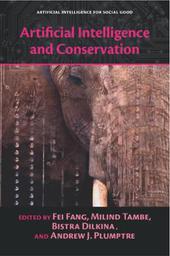
|
Artificial Intelligence and Conservation
Paperback / softback
Main Details
| Title |
Artificial Intelligence and Conservation
|
| Authors and Contributors |
Edited by Fei Fang
|
|
Edited by Milind Tambe
|
|
Edited by Bistra Dilkina
|
|
Edited by Andrew J. Plumptre
|
| Series | Artificial Intelligence for Social Good |
|---|
| Physical Properties |
| Format:Paperback / softback | | Pages:246 | | Dimensions(mm): Height 228,Width 151 |
|
| Category/Genre | Conservation of the environment
Artificial intelligence |
|---|
| ISBN/Barcode |
9781108464734
|
| Classifications | Dewey:333.72028563 |
|---|
| Audience | | Professional & Vocational | | Tertiary Education (US: College) | |
|---|
| Illustrations |
Worked examples or Exercises; 20 Halftones, unspecified; 33 Line drawings, unspecified
|
|
Publishing Details |
| Publisher |
Cambridge University Press
|
| Imprint |
Cambridge University Press
|
| Publication Date |
28 March 2019 |
| Publication Country |
United Kingdom
|
Description
With the increasing public interest in artificial intelligence (AI), there is also increasing interest in learning about the benefits that AI can deliver to society. This book focuses on research advances in AI that benefit the conservation of wildlife, forests, coral reefs, rivers, and other natural resources. It presents how the joint efforts of researchers in computer science, ecology, economics, and psychology help address the goals of the United Nations' 2030 Agenda for Sustainable Development. Written at a level accessible to conservation professionals and AI researchers, the book offers both an overview of the field and an in-depth view of how AI is being used to understand patterns in wildlife poaching and enhance patrol efforts in response, covering research advances, field tests and real-world deployments. The book also features efforts in other major conservation directions, including protecting natural resources, ecosystem monitoring, and bio-invasion management through the use of game theory, machine learning, and optimization.
Author Biography
Fei Fang is Assistant Professor of Computer Science at Carnegie Mellon University, Pennsylvania. Her work won the Innovative Application Award at the Conference on Innovative Applications of Artificial Intelligence in 2016 and the Outstanding Paper Award in Computational Sustainability Track at the International Joint Conferences on Artificial Intelligence in 2015. Milind Tambe is Helen N. and Emmett H. Jones Professor of Engineering and Founding Co-Director of the University of Southern California Center for Artificial Intelligence in Society. He received the International Joint Conferences on Artificial Intelligence (IJCAI) John McCarthy Award, the Association for Computing Machinery's Special Interest Group on Artificial Intelligence (ACM/SIGAI) Autonomous Agents Research Award, Christopher Columbus Fellowship Foundation Homeland security award, an the Institute for Operations Research and the Management Sciences (INFORMS) Wagner prize in Operations Research and is a fellow of Association for Advanced Artificial Intelligence (AAAI) and Association of Computing Machinery ACM). Bistra Dilkina is Assistant Professor of Computer Science and Associate Director of the University of Southern California Center for Artificial Intelligence in Society. Prior to that, she was an Assistant Professor at Georgia Tech and a Co-Director of the Data Science for Social Good Atlanta program. She has published at top artificial intelligence conferences as well as journals such as Conservation Biology. Andrew J. Plumptre is Head of the Key Biodiversity Areas Secretariat, associated with the Conservation Science Group in the Zoology Department at the University of Cambridge. He previously was the Wildlife Conservation Society's senior scientist for Africa and managed a regional program of conservation in the Albertine Rift that supported conservation of some of Africa's most biodiverse sites.
Reviews'No question - we need to transform how we monitor, model, and ultimately manage Earth's natural resources. Artificial intelligence can accelerate that transition but requires a new community of AI inventors and conservation scientists working together. This book represents a gathering of the world's top minds in AI and conservation jointly building the future building blocks of a conservation revolution. Fascinating, future-making insights!' Lucas Joppa, Chief Environmental Officer, Microsoft 'While we hear more about artificial intelligence in the news each day, most conservation professionals have only a vague understanding of what this technological revolution may mean for our work. Artificial Intelligence and Conservation sheds light on the subject, with a particular focus on combating wildlife crime, supplemented by other applications including fire management, invasive species response, and harnessing citizen science. An important and timely resource.' Thomas Brooks, Chief Scientist, International Union for Conservation of Nature 'The book Artificial Intelligence and Conservation brings together, for the first time, examples of computational research that address problems in conservation. The contributors articulate the challenges of using artificial intelligence to solve biodiversity conservation problems, as well as the urgency of the necessity to do so. It is a sweeping exposition, ranging from using game theory to fight poaching, to optimizing decisions through Markov modeling to manage invasive species. The collection showcases how rigorous computational research can make an impact helping save our planet's wildlife. The readers will not only discover interesting computational problems and solutions, but will be inspired to work in this unique application of artificial intelligence and, I hope, will solve the many pressing open problems posed by the authors.' Tanya Berger-Wolf, University of Illinois, Chicago
|